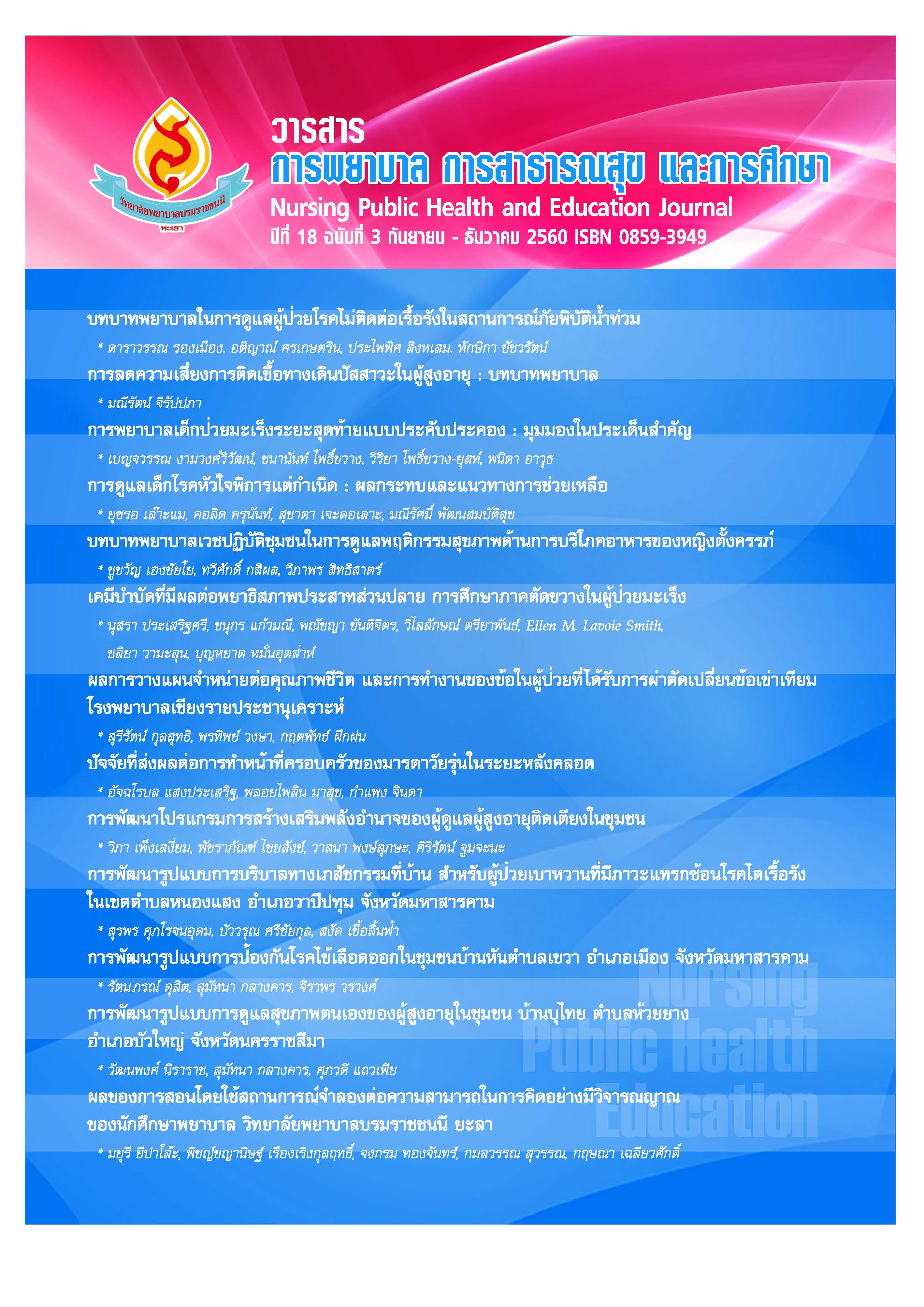เคมีบำบัดที่มีผลต่อพยาธิสภาพประสาทส่วนปลาย การศึกษาภาคตัดขวางในผู้ป่วยมะเร็ง Chemotherapy-Induced Peripheral Neuropathy (CIPN) : A Cross-Sectional Study in Cancer Patients
คำสำคัญ:
เหตุพยาธิสภาพประสาทส่วนปลายเนื่องจากเคมีบำบัด, มะเร็ง, เคมีบำบัด, Chemotherapy-Induced Peripheral Neuropathy (CIPN), Cancer, Chemotherapyบทคัดย่อ
พยาธิสภาพประสาทส่วนปลายเนื่องจาก เคมีบำบัด Chemotherapy-induced peripheral neuropathy (CIPN) มีผลกระทบด้านลบต่อคุณภาพชีวิตผู้ป่วย พบว่ามีข้อมูลจำกัดเกี่ยวกับ อุบัติการณ์ ความรุนแรงและลักษณะของ CIPN ในผู้ป่วยมะเร็งไทย วัตถุประสงค์การวิจัยเพื่อศึกษาอุบัติการณ์ ความรุนแรงและลักษณะของ CIPN ในผู้ป่วยมะเร็งไทยที่ได้รับการรักษาด้วยเคมีบำบัด เป็นการศึกษาภาคตัดขวางเชิงพรรณนา กลุ่มตัวอย่างเป็นผู้ป่วยมะเร็งจำนวน 297 คน ที่ได้รับการรักษาด้วยเคมีบำบัดในแผนกผู้ป่วยนอกโรงพยาบาลมะเร็งอุบลราชธานี ระหว่าง เดือน มกราคม ถึง เมษายน 2559 เกณฑ์คัดเข้ากลุ่มตัวอย่างเป็นผู้ป่วยมะเร็งอายุมากกว่า18 ปี ทุกระยะของโรคมะเร็ง และได้รับการรักษาด้วยเคมีบำบัดที่ทำลายเส้นประสาทส่วนปลาย ประเมิน CIPN ด้วยแบบสอบถาม the QLQ-CIPN20 Thai version ผลการศึกษากลุ่มตัวอย่างส่วนใหญ่เป็นเพศหญิง (ร้อยละ75.6) อายุเฉลี่ย 51.8 ปี (SD ± 11.4) พบว่า CIPN ที่มีอาการระบบประสาทความรู้สึก และระบบประสาทการเคลื่อนไหว ร้อยละ 49.6 และ 26.8 ตามลำดับ CIPN ที่เกิดอาการปวด (shooting or burning pain) มือและเท้าร้อยละ 29.6 และ 25.5 ตามลำดับ โดยสรุป CIPN พบในผู้ป่วยโรคมะเร็งที่ให้การรักษาด้วยเคมีบำบัด โดยเฉพาะอาการทางประสาทความรู้สึกส่วนบนและส่วนล่างของร่างกาย การศึกษาต่อไปควรศึกษาการป้องกันและบรรเทาอาการของ CIPN
คำสำคัญ : เหตุพยาธิสภาพประสาทส่วนปลายเนื่องจากเคมีบำบัด มะเร็ง เคมีบำบัด
Chemotherapy-induced peripheral neuropathy (CIPN) has a negative effect on health-related quality of life (HRQOL). There was little is known about CIPN incidence, severity, and characteristics as experienced by cancer populations in Thailand. The purpose of this study was to describe CIPN incidence, severity, and characteristics in Thai cancer patients who received neurotoxic chemotherapy. This study used a cross-sectional and descriptive design. We recruited cancer patients (N = 297) from the chemotherapy outpatient department of a cancer hospital in Thailand between January 2016 and April 2016. Eligible patients were ≥18 years of age with any stage of cancer and had received neurotoxic chemotherapy. The Quality of Life Questionnaire-Chemotherapy-Induced Peripheral Neuropathy (QLQ-CIPN20) was used to assess pain neuropathy. Most participants were female (75.6%). The mean age was 51.8 ± 11.4 years. CIPN sensory and motor symptoms were reported by 49.6% and 26.8 %, respectively. CIPN related pain (shooting or burning pain) in hands and feet were found in 29.6% and 25.5%, respectively. Conclusions, CIPN and CIPN related pain are common in Thai cancer patients, particularly sensory symptoms in the upper and the lower extremities. Future studies should focus on prevention and relief of CIPN symptoms.
Keyword ; Chemotherapy-Induced Peripheral Neuropathy (CIPN), Cancer, Chemotherapy



